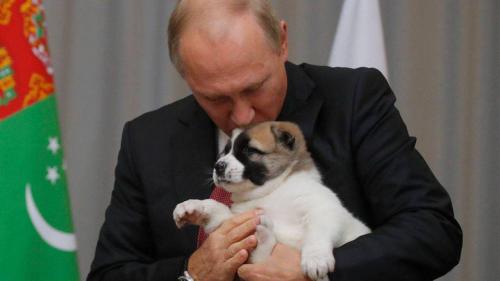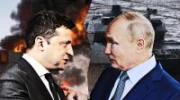Putin-setä asuu Venäjällä,
ja sieltä on liian lyhyt matka Ukrainaan.
Mutta minusta vain tuntuu, että
Putin-setä asuu yhtä kaukana kuin setä Kim Jong-un.
Putinilla on niin suuret luulot,
että niitä pelkää koko Krim ja Sevastopolkin.
Ja Putin-setä hymyilee,
ja pyssyt paukkuvat, ja hän johtaa niin kuin setä Kim Jong-un.
Putin-setä asuu Moskovassa.
Minä kutsun hänet kylään tänne Harkovaan.
Hän rakastaa meitä.
Meille hän on aivan yhtä kultainen kuin setä Kim Jong-un.
Minä olen kylmän sodan henki,
ja vähäinen on vielä minun järkeni.
Mutta tyhmäkin voi taistella
rauhan puolesta kuin Putin tai setä Kim Jong-un,
rauhan puolesta kuin Putin tai setä Obama.
ja sieltä on liian lyhyt matka Ukrainaan.
Mutta minusta vain tuntuu, että
Putin-setä asuu yhtä kaukana kuin setä Kim Jong-un.
Putinilla on niin suuret luulot,
että niitä pelkää koko Krim ja Sevastopolkin.
Ja Putin-setä hymyilee,
ja pyssyt paukkuvat, ja hän johtaa niin kuin setä Kim Jong-un.
Putin-setä asuu Moskovassa.
Minä kutsun hänet kylään tänne Harkovaan.
Hän rakastaa meitä.
Meille hän on aivan yhtä kultainen kuin setä Kim Jong-un.
Minä olen kylmän sodan henki,
ja vähäinen on vielä minun järkeni.
Mutta tyhmäkin voi taistella
rauhan puolesta kuin Putin tai setä Kim Jong-un,
rauhan puolesta kuin Putin tai setä Obama.
Contributed by Juha Rämö - 2022/10/9 - 20:08
Language: Italian
Traduzione italiana / Italian translation / Traduction italienne / Italiankielinen käännos:
Riccardo Venturi, 10-10-2022 07:59

Riccardo Venturi, 10-10-2022 07:59

Zio Putin sta in Russia
Zio Putin sta in Russia,
e, da lì, ci vuole poco per andare in Ucraina.
Però ci ho come l'impressione
che zio Putin stia proprio lontano, come zio Kim Jong-un.
Quel Putin ci ha delle idee così assurde,
che spaventano assai tutta la Crimea e anche Sebastopoli.
E zio Putin sorride,
e le armi crèpitano, e lui si comporta come zio Kim Jong-un.
Zio Putin sta a Mosca,
lo inviterò a farmi visita qui a Charkiv.
Lui ci ama.
Per noialtri è carino, come zio Kim Jong-un.
Io sono lo spirito della guerra fredda,
e quindi sono ottuso.
Ma anche un idiota può combattere
per la pace, come quel Putin o zio Kim Jong-un,
per la pace, come quel Putin o zio Obama.
Zio Putin sta in Russia,
e, da lì, ci vuole poco per andare in Ucraina.
Però ci ho come l'impressione
che zio Putin stia proprio lontano, come zio Kim Jong-un.
Quel Putin ci ha delle idee così assurde,
che spaventano assai tutta la Crimea e anche Sebastopoli.
E zio Putin sorride,
e le armi crèpitano, e lui si comporta come zio Kim Jong-un.
Zio Putin sta a Mosca,
lo inviterò a farmi visita qui a Charkiv.
Lui ci ama.
Per noialtri è carino, come zio Kim Jong-un.
Io sono lo spirito della guerra fredda,
e quindi sono ottuso.
Ma anche un idiota può combattere
per la pace, come quel Putin o zio Kim Jong-un,
per la pace, come quel Putin o zio Obama.
Language: English
English translation / Traduzione inglese / Traduction anglaise / Englanninkielinen käännös:
→ YouTube Video
→ YouTube Video
Uncle Putin lives in Russia
Uncle Putin lives in Mother Russia
Not too far away here from Ukraine
But I just have this feeling
That Uncle Putin's living as far as Uncle Kim-Jong Un
Uncle Putin has so many bamboozles
that the whole Crimea is afraid, and even Sevastopol
Uncle Putin is smiling
and guns are blazing and he's leading like Uncle Kim-Jong Un
Uncle Putin lives in Moscow city
I'm inviting him to visit us here in Kharkov
He loves us so dearly
For us he's just as loved as Uncle Kim-Jong Un
I am the spirit of Cold War
And I'm still not too bright myself
but even a dork can fight for
the peace like Putin and our loved Uncle Kim-Jong Un
the peace like Putin and our loved Uncle Obama
Uncle Putin lives in Mother Russia
Not too far away here from Ukraine
But I just have this feeling
That Uncle Putin's living as far as Uncle Kim-Jong Un
Uncle Putin has so many bamboozles
that the whole Crimea is afraid, and even Sevastopol
Uncle Putin is smiling
and guns are blazing and he's leading like Uncle Kim-Jong Un
Uncle Putin lives in Moscow city
I'm inviting him to visit us here in Kharkov
He loves us so dearly
For us he's just as loved as Uncle Kim-Jong Un
I am the spirit of Cold War
And I'm still not too bright myself
but even a dork can fight for
the peace like Putin and our loved Uncle Kim-Jong Un
the peace like Putin and our loved Uncle Obama
Contributed by Riccardo Venturi - 2022/10/10 - 08:10
Language: Swedish
Traduzione svedese / Swedish translation / Traduction suédoise / Svensk översättning / Ruotsinkielinen käännös: Juha Rämö
Farbror Putin bor i Ryssland
Farbror Putin bor i Ryssland
och därifrån är det en alltför kort väg till Ukraina.
Men det känns nog att
farbror Putin bor lika långt borta som farbror Kim Jong-un.
Putin har så pass orimliga föreställningar
att de väcker rädsla på hela Krim såsom i Sevastopol.
Och farbror Putin ler
och bössorna knallar och han leder såsom farbror Kim Jong-un.
Farbror Putin bor i Moskva.
Jag skall bjuda honom på besök här i Charkiv.
Han älskar oss.
För oss är han lika gullig som farbror Kim Jong-un.
Jag är det kalla krigets anda
och mitt förnuft är ändå ringa.
Men även en dumbom kan kämpa
för fred såsom Putin eller farbror Kim Jong-un,
för fred såsom Putin eller farbror Obama.
Farbror Putin bor i Ryssland
och därifrån är det en alltför kort väg till Ukraina.
Men det känns nog att
farbror Putin bor lika långt borta som farbror Kim Jong-un.
Putin har så pass orimliga föreställningar
att de väcker rädsla på hela Krim såsom i Sevastopol.
Och farbror Putin ler
och bössorna knallar och han leder såsom farbror Kim Jong-un.
Farbror Putin bor i Moskva.
Jag skall bjuda honom på besök här i Charkiv.
Han älskar oss.
För oss är han lika gullig som farbror Kim Jong-un.
Jag är det kalla krigets anda
och mitt förnuft är ändå ringa.
Men även en dumbom kan kämpa
för fred såsom Putin eller farbror Kim Jong-un,
för fred såsom Putin eller farbror Obama.
Contributed by Juha Rämö - 2022/10/9 - 20:09
Language: German
Traduzione tedesca / German translation / Traduction allemande / Deutsche Übersetzung / Saksankielinen käännös: Juha Rämö
Onkel Putin lebt in Russland
Onkel Putin lebt in Russland,
und von dort ist der Weg nach Ukraine zu kurz.
Aber ich habe bloß das Gefühl, dass
Onkel Putin ebenso weit weg lebt wie Onkel Kim Jong-un.
Der Putin hat so große Zumutungen,
dass sie auf der ganzen Krim wie auch in Sewastopol Angst erregen.
Und Onkel Putin lächelt
und Waffen knallen und er leitet wie Onkel Kim Jong-un.
Onkel Putin lebt in Moskau.
Ich werde ihn zu Besuch hier in Charkiw einladen.
Er liebt uns.
Für uns ist er ebenso liebenswert wie Onkel Kim Jong-un.
Ich bin der Geist des kalten Krieges,
und gering ist noch meine Vernunft.
Aber auch ein Dummkopf kann für den Frieden
kämpfen wie der Putin oder Onkel Kim Jong-un,
kämpfen wie der Putin oder Onkel Obama.
Onkel Putin lebt in Russland,
und von dort ist der Weg nach Ukraine zu kurz.
Aber ich habe bloß das Gefühl, dass
Onkel Putin ebenso weit weg lebt wie Onkel Kim Jong-un.
Der Putin hat so große Zumutungen,
dass sie auf der ganzen Krim wie auch in Sewastopol Angst erregen.
Und Onkel Putin lächelt
und Waffen knallen und er leitet wie Onkel Kim Jong-un.
Onkel Putin lebt in Moskau.
Ich werde ihn zu Besuch hier in Charkiw einladen.
Er liebt uns.
Für uns ist er ebenso liebenswert wie Onkel Kim Jong-un.
Ich bin der Geist des kalten Krieges,
und gering ist noch meine Vernunft.
Aber auch ein Dummkopf kann für den Frieden
kämpfen wie der Putin oder Onkel Kim Jong-un,
kämpfen wie der Putin oder Onkel Obama.
Contributed by Juha Rämö - 2022/10/9 - 20:11
The above information about Lenin-setä asuu Venäjällä is not correct. The Finnish version of Ông Lê Nin ở nước Nga is composed by Eero Ojanen to lyrics written by Matti Rossi on the basis of the original Vietnamese text.
Juha Rämö - 2022/10/10 - 09:53
@ Juha Rämö
Thank you Juha. Going to modify my little introduction accordingly.
Thank you Juha. Going to modify my little introduction accordingly.
Riccardo Venturi - 2022/10/10 - 11:04
@ Riccardo Venturi
Dear Riccardo,
As you write above, the "Mother" of this song is Lenin-setä asuu Venäjällä (Uncle Lenin Lives in Russia), originally performed by the young pioneers of Meripioneerit (Sea Pioneers), a Helsinki-based left-wing music ensemble, on their 1972 album Vietnamin Linnut (The Birds of Vietnam). Here's an audio link to the song:
The second stanza of the song begins with the following words: Lenin has such a big forehead that it can accommodate the whole world and even the sky. Impressive, don't you think?
And right again: Putin-setä asuu Venäjällä is sung in a childish, flute-like voice. If you listen to the original version of Lenin-setä asuu Venäjällä by the young pioneers, you'll know why.
Dear Riccardo,
As you write above, the "Mother" of this song is Lenin-setä asuu Venäjällä (Uncle Lenin Lives in Russia), originally performed by the young pioneers of Meripioneerit (Sea Pioneers), a Helsinki-based left-wing music ensemble, on their 1972 album Vietnamin Linnut (The Birds of Vietnam). Here's an audio link to the song:
The second stanza of the song begins with the following words: Lenin has such a big forehead that it can accommodate the whole world and even the sky. Impressive, don't you think?
And right again: Putin-setä asuu Venäjällä is sung in a childish, flute-like voice. If you listen to the original version of Lenin-setä asuu Venäjällä by the young pioneers, you'll know why.
Juha Rämö - 2022/10/10 - 12:06
@ Riccardo Venturi
Coming back to geographical names and internal versus external cases.
You're right that very often the choice between the two is made on a God only knows why basis. To make it just a little bit easier to understand I take an example, Vantaa, my childhood home town and the 4th biggest city in Finland located north of Helsinki. You can say both Vantaalla and Vantaassa, the first one meaning in Vantaa city and the latter one in River Vantaa.
Most Finnish people, of course, know automatically which one to choose, but if in doubt they can rely on a rule. Yes, there really is a rule saying that correct is what the local inhabitants use no matter what the linguists say.
Coming back to geographical names and internal versus external cases.
You're right that very often the choice between the two is made on a God only knows why basis. To make it just a little bit easier to understand I take an example, Vantaa, my childhood home town and the 4th biggest city in Finland located north of Helsinki. You can say both Vantaalla and Vantaassa, the first one meaning in Vantaa city and the latter one in River Vantaa.
Most Finnish people, of course, know automatically which one to choose, but if in doubt they can rely on a rule. Yes, there really is a rule saying that correct is what the local inhabitants use no matter what the linguists say.
Juha Rämö - 2022/10/10 - 12:35
@ Juha Rämö
I've listened to Meripioneerit's Lenin-setä asuu Venäjällä, and now I understand the core of the matter: the song is sung by a true children's choir. Maybe young people would be astonished by this fact: there have been times when children's choirs were requested to sing little songs about Lenin. As you certainly know, Uncle Lenin has such a big forehead that it can accommodate the whole world and even the sky: I wonder if there is any difference with God. This is really impressive.
As for internal and external cases, I remember well what most Finnish grammars and courses of Finnish say. They usually give a list including five or six place names taking the external cases, then say: follow local usage and well, my darling, if you really want to learn Finnish you have to stay long in Finland and then you'll learn to cope with. Hungarian has a similar set of local cases working exactly the same way: I live in Firenzében, go to Firenzébe and come from Firenzéből (internal cases), but you stay in Budapesten, go to Budapestre and come from Budapestről (external cases). That's one reason why Finno-Ugric languages are so charming, I think :-)
I've listened to Meripioneerit's Lenin-setä asuu Venäjällä, and now I understand the core of the matter: the song is sung by a true children's choir. Maybe young people would be astonished by this fact: there have been times when children's choirs were requested to sing little songs about Lenin. As you certainly know, Uncle Lenin has such a big forehead that it can accommodate the whole world and even the sky: I wonder if there is any difference with God. This is really impressive.
As for internal and external cases, I remember well what most Finnish grammars and courses of Finnish say. They usually give a list including five or six place names taking the external cases, then say: follow local usage and well, my darling, if you really want to learn Finnish you have to stay long in Finland and then you'll learn to cope with. Hungarian has a similar set of local cases working exactly the same way: I live in Firenzében, go to Firenzébe and come from Firenzéből (internal cases), but you stay in Budapesten, go to Budapestre and come from Budapestről (external cases). That's one reason why Finno-Ugric languages are so charming, I think :-)
Riccardo Venturi - 2022/10/10 - 18:05
×
![]()
Note for non-Italian users: Sorry, though the interface of this website is translated into English, most commentaries and biographies are in Italian and/or in other languages like French, German, Spanish, Russian etc.







Il punto di partenza di questa “canzoncina attualizzata” sembra essere una simile canzoncina di cinquant'anni fa precisi (1972), intitolata Lenin-setä asuu Venäjällä [*], ovvero “Zio Lenin vive in Russia”. Qui ve la facciamo ascoltare dagli Åttopojat in una registrazione del 2014:
La canzoncina era assolutamente tale: si trattava infatti, in origine, di una canzoncina per bambini vietnamita intitolata Ông Lê Nin ở nước Nga, scritta da tale Nguyễn Hồng Kiên e musicata da Trần Đăng Khoa, nella quale, sulla scorta dello “zio Ho”, diventava zio pure Lenin. La versione finlandese fu preparata da Matti Rossi (1934-2017) sulla base del testo originale vietnamita, e poi composta da Eero Ojanen. Si noti comunque la vocina infantile flautata (e, probabilmente, campionata) con cui è cantata questa canzoncina sugli zii di turno. [RV]
[*] La “Russia” è un caso curioso nella lingua finlandese. Nel complicato sistema dei “casi locali”, la stragrande maggioranza dei toponimi seguono i cosiddetti “casi interni” (Italiassa, Ranskassa, Helsingissa “in Italia, in Francia, a Helsinki"); la Russia, invece, deve andare ai casi esterni (Venäjällä “in Russia”) al pari, Dio solo sa perché, della città finlandese di Tampere (Tamperella).
The origin of this “updated little song” appears to be a similar, 50 years old little song (1972) named Lenin-setä asuu Venäjällä [*], “Uncle Lenin lives in Russia”. You can listen it from the audio link above, a 2014 version by Åttopojat.
The song was no doubt very little: as a matter of fact, it was a Vietnamese children's song named Ông Lê Nin ở nước Nga, written by a certain Nguyễn Hồng Kiên and set to music by Trần Đăng Khoa, where Lenin turned in another uncle after uncle Ho. The Finnish version was written by Matti Rossi (1934-2017; "Red Lunatics" in Italian!) on the basis of the Vietnamese original, and then composed by Eero Ojanen. The little song on little uncles is noteworthy for its childish, flute-like (and, probably, sampled) singing. [RV]
[*] “Russia” is a rather curious case in the Finnish language. In its complicated system of “local cases”, the great majority of place names take the so-called “internal cases” (Englannissa, Ranskassa, Helsingissa “In England, in France, in Helsinki”); conversely, Russia takes “external” cases (Venäjällä “in Russia”), exactly like -God only knows why- the city of Tampere (Tamperella).